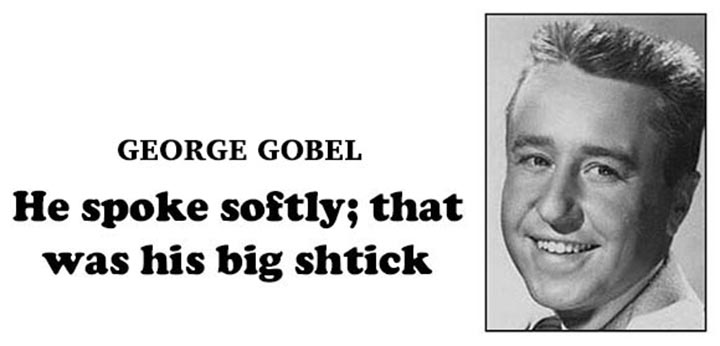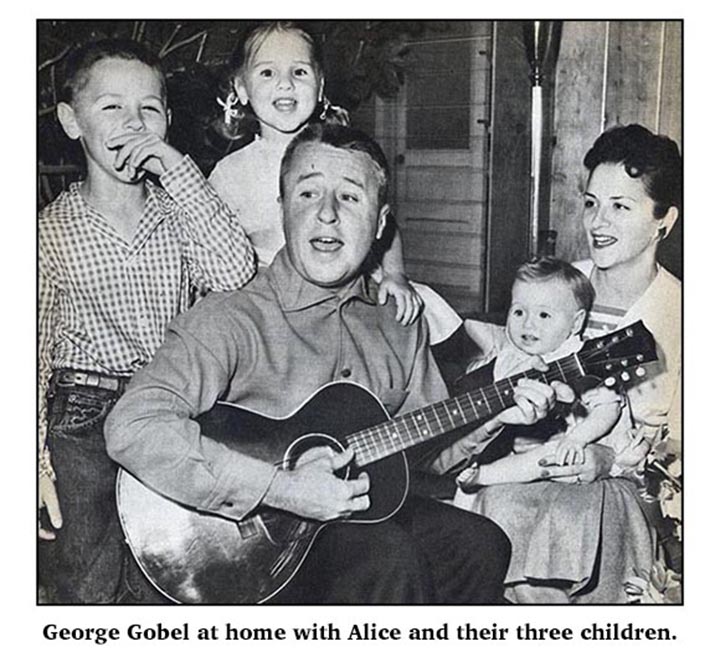 |
You'd have to be in your fifth or sixth year of cashing Social Security checks to remember the impact two young comedians had on the country when he appeared on the scene in their own television shows.
First it was Red Buttons, who arrived with one hand cupped to his ear, hopping up and down, chanting "Ho-ho, ho-ho," before he launching into a hilarious routine about strange things that were happening. That was 1953, but as was often the case, television gobbled up Buttons' material faster than he could produce it. His series, so promising in September, turned sour a few months later, and was not renewed.
But the fall of 1954 gave us "The George Gobel Show." While Buttons was a frantic comedian who'd be at home in the Catskill resorts of the era, Gobel was so low key it was as though he stumbled on stage by accident. He also was hilarious at first, and even when his humor began to fade, well, he was just so likable. His show hung around for six seasons.
Meanwhile, Hollywood gave Gobel a chance to be a star, but it took only two films — "The Birds and the Bees" with Mitzi Gaynor and "I Married a Woman" with Diana Dors — to prove the comedian didn't have what it takes to headline a movie. And while it was possible to think Gobel disappeared soon thereafter, he kept working, making guest appearance in TV show, an occasional movie, game shows galore, and in 1981 turned up as a regular on the Barbara Eden sitcom, "Harper Valley, PTA."
In 1964 I had a phone interview with Gobel, perhaps the only interview I ever did that was tied not to a movie or television program, but to a series of television commercials. |
Akron Beacon Journal, August 16, 1964
Good timing never hurt nobody.
Those immortal words, first uttered by George Washington when he crossed the Delaware River on Christmas Eve in 1776, were repeated last month when George Gobel received word he was the TV hit of the Republican National Convention.
Gobel did commercials for Xerox on ABC that week, and his appearances shared honors with the Gulf Oil commercials (especially the one with the ever-rolling tire) for providing the week’s video highlights.
Never did commercials look so good. And never did a program — in this case, an exceedingly dull four-day political convention — look so bad by comparison.
Gobel will be back with Xerox and ABC this week and next when the duplicating machine company helps sponsor pre-convention and convention coverage from the Democrats’ shindig in Atlantic City. Another dull convention is in prospect, so it looks again as though Gobel’s timing will be perfect.
ABC will attempt to liven things by presenting more of Gobel during this convention. This will be done in the form of short bits called, “George Gobel, a Man Who . . . ”
“We got that name from the cliche you hear all the time at conventions,” said Goble. “You know, ‘I nominate Edgar Floom, a man who . . . ”
Gobel’s commentaries will be based on people and events at the convention.
The Republican picnic in San Francisco was Gobel’s first experience with a national political convention. Like most TV viewers, he found the California gathering pretty tedious.
“All those speeches,” he moaned. “I think the party ought to do something about them. It’s kind of meaningless when a guy delivers the third seconding speech for the nomination of Margaret Chase Smith. It’s not like he was going to influence any delegates.
“Of course, I realize it would be nearly impossible to change a convention, especially since television is covering it. Everyone wants to get equal time on camera. The speakers didn’t seem to care if anyone on the convention floor wa listening. They were happy just because the television cameras were focused on them.
“I really think television could make a convention more interesting by covering it less.”
Then I asked Gobel how a nice guy like him got mixed up in commercials.
And he said he wasn’t sure how a nice guy like him got mixed up in commercials. If I really wanted to find out, I should call his agent.
“I didn’t know a thing about the job until my agent called and said I had it.”
Gobel agreed with his agent that the Xerox job was safe. “I couldn’t do a soap or toothpaste commercial without running an awful risk.”
Why? Well, it works this way, friends.
Say, for instance, that Gobel ldoes a Dial soap commercial, and a few months later tries to peddle a television show to one of the networks.
And a network is very interested in the program, but only if Procter and Gamble is willing to sponsor it .. . . and P&G tells the network to pass on Gobel’s program because the comedian is too closely associated with a soap made by a rival company.
“But Xerox makes machines for offices,” said Gobel, “and there isn’t much danger of finding a sponsor conflict.”
Xerox tapped Gobel for the job because it wanted a soft-sell campaign, and the comedian is considered a soft-sell guy.
“I’m not one of those guys who makes you feel like running down to the neighborhood store immediately and buying something . . . which is pretty good because nobody can run down to the neighborhood store and buy a Xerox, anyway.”
I asked him what he had done between conventions, and he replied that he had just returned to his California home after working state fairs in Peoria, Illinois, and Great Falls, Montana.
“And you can’t believe how tired a person can get of flying from Peoria to Great Fall,” he went on. “I had to stop in Chicago for four hours, then hop to Minneapolis, where I waited three hours. Finally, I got a flight to Great Falls on an airline I had never heard of and by the time I finally got to Montana, I felt like I had been traveling a week.”
But travel is Gobel’s way of life and will remain that way until he comes up with an idea for another television series like the one that made him and his wife, Alice, so famous during the 1950s.
Gobel has television dates lined up with Jack Paar and Red Skelton this fall. He also expects to be a guest on “Hollywood Palace” and “The Jimmy Dean Show.” He also has other fairs to attend, summer stock, and about 20 weeks’ worth of nightclub performances on his calendar.
“Yes, I have all the work I want, but I’d rather have more of it in California. I really don’t like to be away from Alice and the kids all that time.”
I asked him if his experience in San Francisco had whet his appetite for politics. I confess it was a dumb question, but I’d hope he might supply a funny answer. But Gobel played it straight — at first.
“No, sir . . . I don’t want to get into politics. It’s too cutthroat. You know, show business is competitive, but we don’t fight anywhere near as hard as politicians. And they fight dirty. And when somebody fights me dirty, I get mad. And when I get mad, I hold grudges.
“I just couldn’t let another politician calls me all kinds of names for weeks and weeks and then bury the hatchet and help throw a $100-a-plate dinner in bhonor of the other guy.
“Besides,” he added, “I wouldn’t want to be president of a country that had Alice as its first lady.” |
|
 |
Gobel made his last television appearance as a panelis on "The New Hollywood Squares" in April, 1988. He died three years later after heart surgery. He was 71 years old, survived by the former Alice Humecki, who had been his wife for 49 years, and his three children.
Like Gobel, Red Buttons also kept his career going, though he had much more success as an actor than did most stand-up comics. He won a best supporting actor Academy Award in 1957 for his performance in "Sayonara," and also appeared in such films as "Imitation General," "The Big Circus," "One, Two, Three," "Hatari," and "The Longest Day," in which he had a memorable scene as the paratrooper who got stuck in a church tower.
He had a short-lived second series, "The Double Life of Henry Phyfe," a comedy about a mild-mannered accountant who becomes a secret agent, and had a recurring role in "Knots Landing" in 1987, riding off in the sunset with Julie Harris, a most unusual pairing. He also made five appearances as "Ruby" Rubadoux in "ER."
But he was best known for his "never got a dinner" routine that he tailored for various targets during a series of "Dean Martin Celebrity Roasts." Just Google "Red Buttons" "never got a dinner" and you'll be offered several video clips via YouTube. My favorite is the Frank Sinatra roast where Buttons wonders why Sinatra is getting a dinner when so many other famous Italians didn't, at which point he begins spoofing everyone from Marco Polo to Christopher Columbus to Rudolph Valentino to John Travolta "who once said, 'My Saturday night fever wasn't as bad as my Sunday morning rash!' He never got a dinner!"
Buttons died in 2006; he was 87 years old. He was survived by his third wife, Alicia Pratts, and two children. |
| |
|


